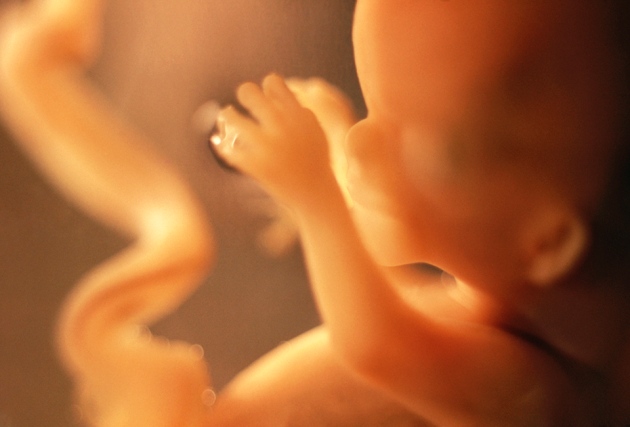|
 
- 现金
- 62111 元
- 精华
- 26
- 帖子
- 30437
- 注册时间
- 2009-10-5
- 最后登录
- 2022-12-28

|
Eye-opening picture of fetal immune system emerges Human fetuses have an immune system that acts differently from the adult version.
14 June 2017
Article tools Rights & Permissions
 Dopamine/SPL By 13 weeks of gestation, human fetuses have developed a much more unusual immune system than previously thought.
A human fetus in its second trimester is extraordinarily busy. It is developing skin and bones, the ability to hear and swallow, and working on its first bowel movement. Now, a study published on 14 June in Nature finds that fetuses are also acquiring a functioning immune system — one that can recognize foreign proteins, but is less inclined than a mature immune system to go on the attack (N. McGovern et al. Nature http://dx.doi.org/10.1038/nature22795; 2017).
The results add to a growing body of literature showing that the fetal immune system is more active than previously appreciated. “In general textbooks, you see this concept of a non-responsive fetus is still prevailing,” says immunologist Jakob Michaelsson at the Karolinska Institute in Stockholm. But the fetal immune system is unique, he says. “It’s not just immature, it’s special.”
A developing fetus is constantly exposed to foreign proteins and cells, which are transferred from the mother through the placenta. In humans, this exposure is more extensive than in many other mammals, says immunologist Mike McCune at the University of California, San Francisco. As a result, laboratory mice have proved a poor model for studying the developing human fetal immune system.
But fully understanding that development could reveal the reasons for some miscarriages, as well as explain conditions such as pre-eclampsia, which is associated with abnormal immune responses to pregnancy and causes up to 40% of premature births. And organ-transplant surgeons have long been interested in how a developing fetus and its mother tolerate one another without either of them launching an immune attack — the hope is to find ways to suppress the immune system’s response to transplanted organs.
For Jerry Chan, an obstetrician and gynaecologist at the KK Women’s and Children’s Hospital in Singapore, understanding the fetal immune system was important for his goal of developing stem-cell treatments and gene therapies for genetic disorders in developing fetuses. Chan and his colleagues wanted to know whether there was a developmental stage at which such treatments could be given without the risk of the therapies themselves being attacked by the immune system.
To do this, Chan teamed up with immunologist Florent Ginhoux at the Agency for Science, Technology and Research in Singapore to study dendritic cells, immune cells that break down foreign material and present fragments of it to other immune cells called T cells. Some T cells are then activated to target the foreign material for destruction.
The team found that human fetuses have functional dendritic cells by 13 weeks of gestation. But although the cells behave much like the adult versions, their response to foreign human proteins differs: rather than mark the foreign material for annihilation, fetal dendritic cells are more likely to activate a special category of T cell called regulatory T cells, which suppress immune responses.
This could reflect a need to avoid a catastrophic immune response against a mother’s cells. “You don’t want too much immune response in a developing fetus,” says Ginhoux. “It is very dangerous — this is a critical point in development.”
Previous studies had found specialized immune cells — including T cells and natural killer cells — in fetuses as young as nine weeks, says Ginhoux.
But the dendritic-cell findings are particularly important because these cells orchestrate immune responses, says Michaelsson. Without them, he says, the body can’t target specific foreign material for destruction.
The results highlight the fact that the fetal immune system is not merely an immature, less-active version of its adult counterpart, but one that has its own distinct function, says transplant immunologist William Burlingham at the University of Wisconsin in Madison.
Burlingham’s laboratory had been studying fetal immune responses as a means of finding ways to help organ-transplant recipients tolerate their new organs without relying on immunosuppressive drugs. But a political uproar in the United States during the past few years over research using fetal tissue has made him shift much of his work to studying the newborn immune system, which tends to act more like the adult system.
The Nature study highlights how this shift could come at a price for many areas of research, says McCune. “It’s important for us to understand the function of the human fetal immune system so that we can treat fetuses that are not doing well,” he says. “And the analysis of adult and newborn cells is, as we now know, irrelevant. The fetal immune system is different.”
Nature546,335–336(15 June 2017)doi:10.1038/546335a
|
|